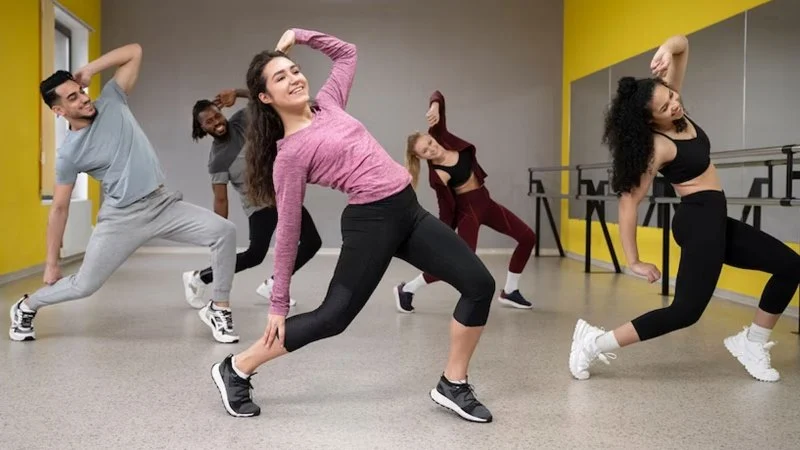 The Health Benefits of Dance: Scientific Backing for Why It's So Good for Youhealth benefits of dance, dance and health, scientific benefits of dancing, how dance improves health, physical benefits of dance, mental benefits of dance, dancing for wellnessDiscover the health benefits of dance and how it can improve your physical and mental well-being. Learn about the scientific evidence supporting dance as a powerful tool for health and fitness. Visit Creative Edge Dance Studio for more information and services.
The Health Benefits of Dance: Scientific Backing for Why It's So Good for Youhealth benefits of dance, dance and health, scientific benefits of dancing, how dance improves health, physical benefits of dance, mental benefits of dance, dancing for wellnessDiscover the health benefits of dance and how it can improve your physical and mental well-being. Learn about the scientific evidence supporting dance as a powerful tool for health and fitness. Visit Creative Edge Dance Studio for more information and services.- 1. Why Dance Is Good for You: An Overview
- 2. Scientific Backing for Dance’s Health Benefits
- 3. Physical Benefits of Dancing
- 4. Mental Health Benefits of Dance
- 5. Real-Life Examples: How Dance Changed Lives
1. Why Dance Is Good for You: An Overview
Dance is more than just an enjoyable activity—it has profound effects on both physical and mental health. Whether you’re taking a ballet class, grooving to hip-hop, or enjoying a social dance like salsa, dance is one of the most holistic forms of exercise. It improves cardiovascular health, builds strength, enhances flexibility, and even boosts brain function.
In 2025, with many people focusing on improving their well-being, dancing is emerging as one of the most effective and accessible ways to stay fit. What makes dance unique is its ability to engage both the body and the mind simultaneously, offering a fun and engaging way to stay active. Plus, with so many styles to explore, dance is enjoyable for everyone—whether you’re a seasoned professional or just starting out.

Luna Aerial Dance & Performing Arts / luna aerial
FrederickFrederick CountyMaryland
4750 Winchester Blvd #7, Frederick, MD 21703, USA
2. Scientific Backing for Dance’s Health Benefits
The health benefits of dance are not just anecdotal—there is solid scientific research that supports its positive impact on overall well-being. Studies show that dance improves cardiovascular health, strengthens muscles, and enhances cognitive function. Here’s a breakdown of some of the research supporting dance as a powerful health tool:
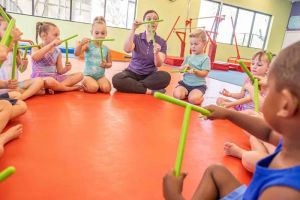
The Little Gym of Pearland / the little gym pearland
9607 Broadway St, Pearland, TX 77584, USA
1. Cardiovascular Health
Dance has been shown to significantly improve heart health. A study published in the *American Journal of Preventive Medicine* found that people who danced regularly had improved cardiovascular fitness compared to those who engaged in more traditional forms of exercise, such as jogging or cycling. The rhythmic nature of dance helps increase heart rate, improve circulation, and boost overall stamina, leading to better cardiovascular health.
2. Cognitive Function and Brain Health
Research also shows that dance can enhance brain function and improve memory. A study from the *New England Journal of Medicine* found that older adults who participated in dance activities experienced a reduced risk of dementia. Dance stimulates the brain by requiring coordination, memory, and concentration, which helps maintain cognitive function and improve mental clarity.
3. Weight Management and Metabolism
Because dance is a full-body workout, it can help with weight management. According to the *Journal of Physical Activity and Health*, people who engage in dance-based exercise programs burn calories at rates similar to or even higher than those participating in other forms of aerobic exercise. This makes dance an excellent option for maintaining a healthy weight while also improving muscle tone and flexibility.
3. Physical Benefits of Dancing
Dance is a high-impact, dynamic activity that engages almost every muscle group, offering a wide range of physical benefits. Here’s how dancing helps your body:
1. Improved Strength and Endurance
Dancing regularly helps build strength, particularly in the core, legs, and arms. The constant shifting of weight and changing of positions improves overall muscle tone and endurance. Whether you're lifting your body weight in ballet or using your arms to power through a hip-hop routine, dancing helps increase muscle strength and stamina.
2. Flexibility and Balance
Many forms of dance, such as ballet or contemporary, require deep stretches and fluid movements, which can improve flexibility. Dance also works on improving balance and coordination, making it a great option for preventing falls, especially as we age. A study from the *Journal of Aging and Physical Activity* found that older adults who danced showed improved balance, flexibility, and coordination.
3. Cardiovascular Endurance
When you engage in dance, especially at a higher intensity, you elevate your heart rate, improve circulation, and strengthen your heart. The constant movement required in dances like Zumba or jazzercise provides excellent aerobic benefits, improving cardiovascular endurance over time.
4. Mental Health Benefits of Dance
In addition to the physical benefits, dance has a profound impact on mental health. Here’s how:
1. Stress Reduction
One of the most immediate mental health benefits of dance is stress reduction. Dance allows you to let go of tension, clear your mind, and focus on the rhythm of your movements. Studies show that dance significantly lowers levels of cortisol, the hormone responsible for stress, leading to a more relaxed state. Whether it’s through structured dance classes or free-form movement at home, dance can be a great stress reliever.
2. Boosted Mood and Endorphins
Dance triggers the release of endorphins, the body's natural mood elevators. These feel-good chemicals help combat feelings of anxiety and depression, making dance a powerful tool for improving mental well-being. In fact, a study from *The Arts in Psychotherapy* found that participants in dance programs reported feeling happier, more energized, and less anxious after completing a session.
3. Social Connection and Confidence
For many people, dance offers an opportunity to connect with others. Whether you’re attending a group dance class or joining a social dance event, dance can foster a sense of community and belonging. The positive social interaction can boost self-esteem and reduce feelings of loneliness. Additionally, mastering a new dance move or routine can significantly enhance personal confidence.
5. Real-Life Examples: How Dance Changed Lives
Take the story of Laura, a 35-year-old office worker from Chicago who struggled with stress and weight management. After taking a few dance classes at Creative Edge Dance Studio, Laura noticed significant improvements in both her physical and mental health. Not only did she lose weight, but she also felt more energized and less anxious after each session. She credits dance with helping her build confidence and manage work-related stress.
Another inspiring story comes from Mark, a retiree who started taking ballroom dancing lessons in his late 60s. Initially, Mark joined the class for fun, but soon realized the physical benefits, such as increased flexibility and improved balance. As a result, his doctor reported improvements in his joint health and mobility, and Mark felt more socially connected than ever.
These examples demonstrate how dance can positively impact individuals of all ages, helping them achieve better health, wellness, and social engagement.


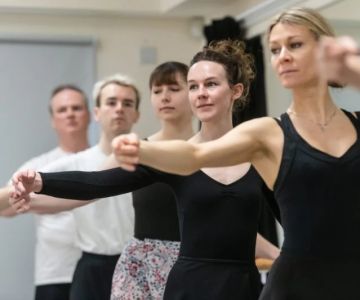

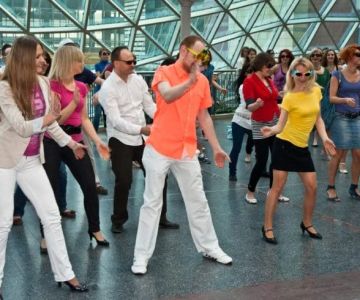


 Laya Natyalaya Dance School5.0 (24 reviews)
Laya Natyalaya Dance School5.0 (24 reviews) Eubie Blake National Jazz Institute and Cultural Center4.0 (234 reviews)
Eubie Blake National Jazz Institute and Cultural Center4.0 (234 reviews) Jazzercise5.0 (107 reviews)
Jazzercise5.0 (107 reviews) Burlington Academy of Dance & Arts4.0 (23 reviews)
Burlington Academy of Dance & Arts4.0 (23 reviews)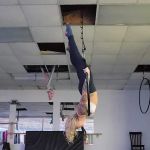 Studio 360 Pole Fitness, dance and gym3.0 (17 reviews)
Studio 360 Pole Fitness, dance and gym3.0 (17 reviews) In Motion Dance Center Inc4.0 (36 reviews)
In Motion Dance Center Inc4.0 (36 reviews) What is Dance and Technology? Exploring Interactive Performances
What is Dance and Technology? Exploring Interactive Performances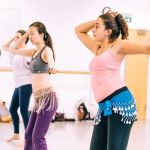 How Dance Classes Can Improve Your Posture and Body Awareness
How Dance Classes Can Improve Your Posture and Body Awareness What is Zumba? Fitness Party or Dance Training?
What is Zumba? Fitness Party or Dance Training? What is Forró? The Brazilian Partner Dance
What is Forró? The Brazilian Partner Dance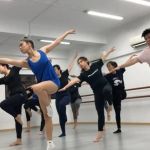 My Story of Learning Fusion Jazz After Years of Traditional Ballet
My Story of Learning Fusion Jazz After Years of Traditional Ballet The Best Online Dance Classes for Beginners According to Reddit
The Best Online Dance Classes for Beginners According to Reddit